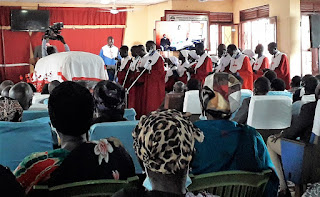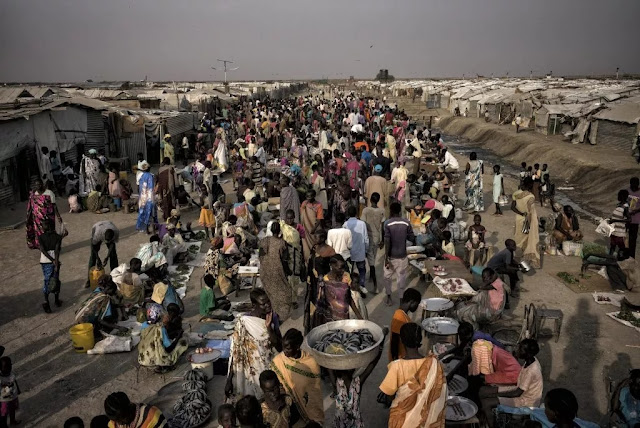Most South Sudanese people spend a lot of time attending funerals. We hear friends lamenting that it feels that there are so many funerals, and death comes too early and often here. We admire the way that people come together when death happens, and the way that they commemorate the person with multiple gatherings over a period of up to a year. People also take seriously celebrating the joyful occasions in life, like a wedding, perhaps because they know life can not be taken for granted. This month we have attended a few funerals and a wedding, so wanted to share some pictures from this significant part of life in South Sudan.
Elder Daniel was an active member and influential leader in the South Sudan Presbyterian Evangelical Church. He passed away in June after a short period of sickness. He also held a high position in the government, so his funeral was attended by thousands of people. They first held the service in the church followed by burial at the home on the day that his body was brought from Nairobi. A few days later, they had a larger gathering to celebrate his life and pray together. Next week marks 40 days since his death, so another service of ‘final prayers’ will be held at his home.
Today, I visited Elder Daniel’s wife, Mama Achol. She remains at home for 40 days, and some close family members stay with her to keep her company in this period of mourning. Friends and relatives come to visit – today while I was there, several other women came just to be with her and the family. The women shared news and told stories, laughing and lamenting at the same time. We admire the real sense of community in South Sudanese culture and the way that people are present with each other, particularly in times of grief.
Last week, Bob visited a colleague whose son had just died. Bob was not able to attend the funeral, but wanted to express his condolences. Visiting someone who is grieving is an important expression of solidarity. However, suddenly having the expenses of a funeral and hosting visitors can also become a burden to the grieving family, particularly for people wrestling with poverty and in a country where it feels like many people go from one crisis to another.
And then, some celebration! Last week I attended a wedding. It feels like there are far more funerals than weddings in Juba, so it was a rare treat to be invited to a wedding. A wedding also has several components and ceremonies –the dowry or engagement, the traditional ceremony, a church ceremony, and finally a reception. These might all happen on different days, so we admire the time and expense people invest in celebrating these life milestones. I attended the church ceremony last week – a joyful service with lots of singing, words of encouragement by relatives, and an exhortation by their pastor, emphasizing the importance of God being first in their marriage, because God dwells within us.
We are so grateful for the people around us in South Sudan, and the gift of being in relationship. We continue to look for advice sometimes on navigating the cultural protocol around these life events. But we have wonderful models and coaches in our colleagues and friends, and it makes us appreciate the gifts this culture has and the ways people make a great effort to stay connected.





.jpg)
%20.jpg)
%20.jpg)



.jpg)